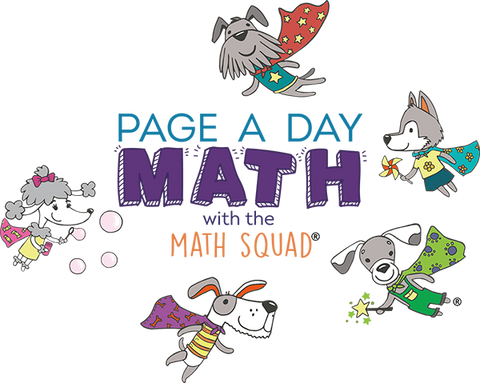
7 Tips for Preventing Math Anxiety
How to Raise Math Stars When Math Sends You Running for the Hills
I’m glad you’re here. We need to have a chat about math anxiety. No, not your child’s math anxiety. Yours. ;)
It turns out that your anxiety around math can actually rub off on your children. But don’t worry, because we’re going to provide you with lots of tips to ensure you don’t spread your math anxiety around.
What Is Math Anxiety?
So, what is math anxiety, anyway? Is it even a real thing? Yes, it’s real, and it affects a LOT of people. If doing math problems makes your heart race and gives you clammy hands, you’re not alone.
Math anxiety is described as experiencing negative emotions when engaging in activities that require math. It has also been expressed as experiencing panic, helplessness, paralysis, and mental disorganization when you’re required to solve a math problem. Studies have revealed that more than 90 percent of adults in the United States experience some level of math anxiety, with 17 percent suffering from a high level.
Researchers have actually studied the brain activity of people who suffer from math anxiety in order to get a better understanding of it. Magnetic Resonance Imaging (MRI) images indicate that the brain activity of those with math anxiety is significantly different than those without it.
When individuals in these studies engaged in math problems, those with math anxiety showed more activity in the amygdala and the insula. The amygdala is what controls our fear response, while the insula plays a role in processing pain. Those that suffered from math anxiety also showed lower activity in the areas of the brain associated with working memory and numerical reasoning. So, yes, math anxiety is real, and it’s not pleasant.
How Can Parents’ Math Anxiety Impact Their Kids?
Of course, nobody wants their child to suffer from math anxiety, but it turns out we could be unknowingly impacting our children’s relationship with math because of our own anxiety. Even parents that don’t have math anxiety say things that impact how their child feels about math without even realizing it.
One study showed that when mothers told their daughters that they themselves were not good at math in school, their daughters’ achievement dropped almost immediately. Just the way we talk about math can impact how our children feel about it, how they approach it, and how well they think they can do.
Do you remember that Barbie doll that came out in the mid-1990’s that said, “Math class is tough!” and everyone lost their minds? No? Am I dating myself? Parents and educators didn’t want Barbie discouraging girls from excelling in math, but parents (and even sometimes educators) unwittingly share this message all the time.
Do you ever say, “I’m not a math person,” or “it’s okay if you don’t like math” to your child? Seemingly innocuous comments can have a big impact on our kids and how they think about math. And today especially, our kids need math in order to have every opportunity open to them.
Another more recent study found that when parents with math anxiety helped their kids with math homework more than once a week, the kids ended up doing worse in math. If the math-anxious parents did not help their kids, the kids did fine. So, yay, math anxiety is not genetic! And, holy cow, how do I help and not hurt my kids?!
How Can You Overcome Your Math Anxiety? (At Least Enough to Fool Your Kids)
Math anxiety is something that can develop early. If you have it, you have likely had it for a long time. I know it’s not something that you can just turn off, but there are ways that you can lessen the impact that it has on your children. Here are some useful tricks, tools, and reminders to help your child have a healthy relationship with math, whether or not you do yourself.
- Pay attention to what you’re saying around your child. Make sure you talk about math in a positive way. Don’t label people as “math people” or “non-math people.” If your child says, “I’m bad at math,” it’s easy to want to empathize and say, “Me, too!” But don’t. Disagree with them, and say something like, “You’re not bad at math, you’re just having trouble with that problem. Keep working at it!”
- Raise the math expectations you have for your child. When kids see that their parents think they can do well in math, they do better in math.
- If it doesn’t cause you too much anxiety, let your kids see when you use math in everyday life. Call attention to when you have to figure out the tip or double the ingredients in a recipe. Math is all around us!
- Promote a growth mindset in your child. You can do this by addressing incorrect answers in a positive way, letting your child know that mistakes are part of how people learn, and rewarding their effort instead of their answer or performance.
- Create a math-positive environment at home. Use Page A Day Math or fun math apps to encourage math as a fun, daily practice.
- Engage in low-pressure activities that incorporate math. Read books about math and numbers. We are all told to read to our young children, so why aren’t we doing math?
- Use blocks to make patterns and shapes. Math can be imaginative and creative.
Math anxiety is a real thing, and it can be hard being a parent with math anxiety who is trying to encourage your child to have a healthier relationship with numbers. But it’s definitely possible and worth it.
The most important thing is simply knowing that your words and expectations impact your child’s beliefs and self-esteem. You may have had a tough time with math, or even believed you weren’t a math person, but your child can still be a math star. And you can make it happen.
To try a sample math book from one of our math kits, click here.
Try our complimentary flashcards, click here.
About the Author and Creator of Page A Day Math
 Janice Marks
Janice Marks
Janice began her career in education to pursue teaching pre-algebra at BASIS Tucson North, a charter school currently ranked as the sixth-best STEM school in the country by Newsweek. There she found joy in teaching math, working with parents, and inspiring children to believe in themselves and thrive. This experience, along with helping her own children succeed in math, led her to develop the Page A Day Math system.





